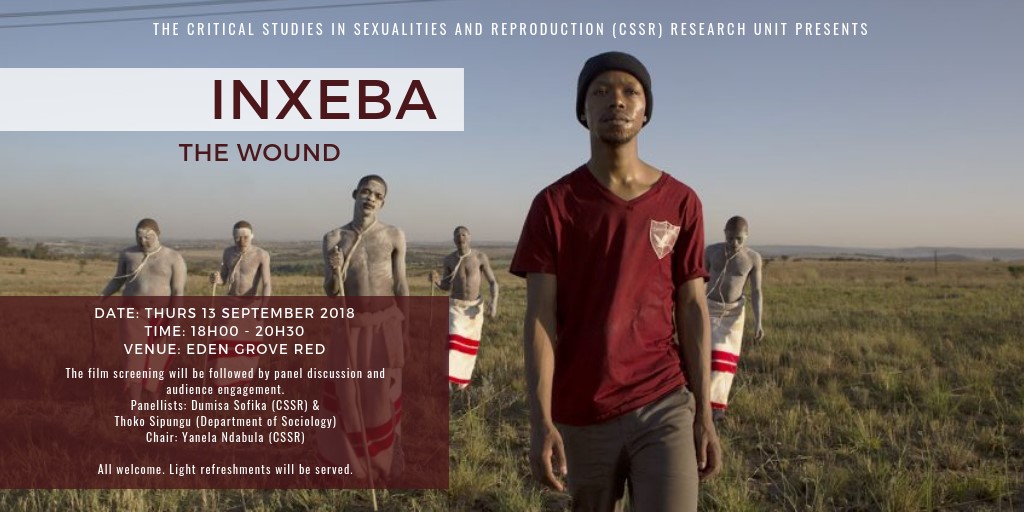
“Xolani, a lonely factory worker, joins the men of his community in the mountains of the Eastern Cape to initiate a group of teenage boys into manhood. When a defiant initiate from the city discovers his best kept secret, Xolani’s entire existence begins to unravel…”
On the 13th of September 2018, the Critical Studies in Sexualities and Reproduction (CSSR) screened the critically acclaimed and multi award-winning film: Inxeba (aka The Wound), at Rhodes University (UCKAR).
Directed and written by John Trengove, Malusi Bengu, and Thando Mgqolozana; it is an intersectional story that follows three men during a male amaXhosa cultural initiation practice (referred to as ‘ulwaluko’). This takes place in the mountains of the Eastern Cape. The main character ‘Xolani’, played by Nakhane Touré, is portrayed as a quiet and gentle factory worker who returns to join the men of the community he grew up in, as a ‘caretaker’ during the initiation. Xolani, due to his perceived gentle nature, is tasked with attending to initiates who are deemed ‘soft’ and in need of more specialised care than the other initiates. The ‘initiate’ whom Xolani is assigned to, ‘Kwanda’, played by Niza Jay Ncoyini, is portrayed as an out-of-town ‘city boy’ being forced by his father to attend the initiation, and take part in this journey from ‘boyhood’ to ‘manhood’. At many points in the film Kwanda questions, rejects, and defies the cultural customs of the initiation practice, which causes tensions to arise. The third main character ‘Vija’, played by Bongile Mantsai, is another caregiver who has a long-standing close relationship with Xolani. However, in contrast to Xolani, Vija is portrayed as aggressively ‘masculine’, and at times this embodiment of hegemonic masculinity becomes unsettling to watch. As the complexities around cultural traditions, notions (and contestations) of certain embodiments of masculinity, and the representations of sexual identities, in conjunction with the numerous roles and relations of each character play out, the painfully complicated and conflicted divisions of loyalty to these are revealed.
The film screening was followed by a panel discussion, open to engagement from the audience. The panellists were: Dumisa Sofika and Zipho Dolomo from the CSSR, and Thoko Sipungu from the Sociology Department.
Yanela Ndabula (CSSR) who chaired this panel, began the screening by asking the panellists, as well as the audience, to keep a few questions in mind when watching the film so that these could be discussed afterwards.
These questionedhow our own social positions and identities, in terms of gender, race, ethnicity, sexual orientation etc., can influence our own viewing and response to the film. Secondly, if one considers the film through a rights-based framework then what rights does the film speak to and how does one understand these rights in relation to other rights? For example, the right to cultural determination, the right to diversity within sexual orientations, and the basic right to life? Furthermore, how can we understand the public backlash to, and criticism of the film? For example, the criticisms that spoke to certain cultural practices, depictions of same-sex relationships, and the representations of these that the film portrayed. Each point was first discussed by each panellist, and then opened to questions and comments from the audience.
The screening was very successfully attended, especially by the student body. This led to a very robust and interesting discussion, compromising of very different views of the film. Just such discussion was one of the main purposes for the CSSR screening Inxeba; to enable a space to deliberate some of the issues and representations invoked by the film. As well as, to consider the various reactions, and criticisms, seen publicly in response to the film (these to name a few included: banning mainstream viewings of the film, disputing the film’s rating in the Gauteng High Court, various cast members/filmmakers receiving death threats and so on - see links below). Events like these, which open a space for often contentious social issues to be explored and reflected on, are important if we are to meaningfully engage with such topics and widen our views and understandings thereof.
Links to news articles/responses to film:
